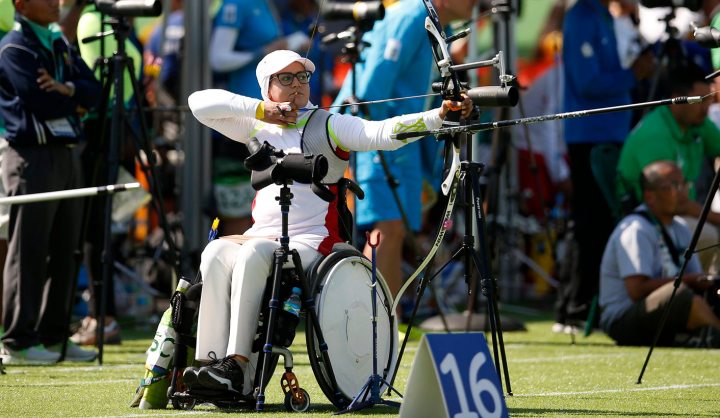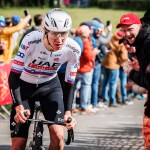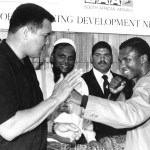From the team of refugees to the rugby player who recovered from a broken neck and beat cancer, these are some of the most inspiring stories of the Games so far. By ANTOINETTE MULLER.
While the Olympics is always good for making you feel inadequate about your measly achievements as a human being and your athletic ineptitude, it’s also a fantastic place to be inspired by great people and the sheer bloody-mindedness of some athletes.
These Games have been no different. There are some amazing people who have overcome the odds to participate in the world’s most prestigious events and will make you want to be a better person. We’ve picked out a few of the best.
Uber-kind stranger helps dad see his son’s debut at the Games
One of sweetest stories so far is that of Ellis Hill, the father of shot putter Darren Hill, was not even going to go to the Olympics. Travelling for mega sporting events is expensive and Hill, who drives an Uber taxi in Philadelphia, was going to have to settle for watching his son on TV. But that all changed when he mentioned to one of his passengers that he wouldn’t be able to go. The Good Samaritan decided to crowd-fund to get him there.
“It was devastating to hear that,” said the passenger, Liz Willock, in an interview with People magazine. “Here’s this wonderful man, who has a close relationship with his son, and I know any parent would want to see their son or daughter compete at the Olympics, but it was very understandable how that could be out of reach.”
From black belt to archery champ
Zahra Nemati is competing for Iran in archery and while you might not think there is anything special about that, her story is quite remarkable. Nemati is a former black belt taekwondo
From near death to a gold medal
Chris Mears, the Team Great Britain diver who won gold on Wednesday, was given a five percent chance to live in 2009 after he ruptured his spleen. While training for the Youth Olympics, Mears had picked up
The rugby player who broke her neck and beat cancer
The US Women’s Sevens team had a somewhat disappointing outing, but they were led through the campaign by the rather remarkable Jillion Potter.
Potter began her rugby career at
During the World Cup in
Running for his life
When Lopez Lomong was just six years old, he was abducted and taken to a prison in Sudan, where he was born. Townspeople would help him escape and make his way to the Kenya border. He stayed there in a refugee camp for a decade before resettling in the US in 2001. In 2003, he was reunited with his mother who he thought had been killed in battle, and in 2009, he travelled back to Sudan to bring his younger brothers to the States. This will be his fourth Olympics, having made his debut at the Games in 2008. He will run in the 5,000m.
Getting back on the horse
William Fox-Pitt is a two-time silver medallist competing at his fifth Olympics. The equestrian rider, who competes in the dressage event, was in a coma just nine months ago after a bad fall during a cross-country race.
The team of refugees who beat all the odds
For the first time at the Olympics, there is a refugee team taking part – all of whom have incredible stories to tell. Yusra Mardini is perhaps the most famous of the team. Mardini nearly drowned while escaping the conflict in Syria, feeling her country after her house was destroyed. The boat she was on began to fill up with water. Just four people on the boat – including Mardini – were able to swim. They pushed the boat for three hours until reaching land. She swam in the women’s 100m butterfly and although she did not advance, she won her heat.
Rami Anis is also from Syria and also fled the conflict aboard a dinghy, and while he did not advance from his heat either, he did set a personal best in the 100m freestyle – what better place to break your own record than at the Olympics?
Another 800m athlete, James Nyang Chiengjiek, is also from South Sudan and also settled in a camp in Kenya. Like Biel, he speaks of not having the right gear to compete and in addition to getting good results at the Olympics, his dream is “also to help people. Because I have been supported by someone, I also want to support someone.”
Rose
Also from South Sudan is 21-year old
Yolande Bukasa Mabika is a refugee
Yonas Kinde, a 36-year-old from Ethiopia, is the oldest member of the team. He fled Ethiopia because of “political problems” and now lives under special protection in Luxembourg. He is a marathon runner who works as a taxi driver. DM
Photo: Zahra Nemati of Iran takes aim during the women’s individual ranking round of the Rio 2016 Olympic Games Archery events at the Sambodromo in Rio de Janeiro, Brazil, 05 August 2016. EPA/YOAN VALAT


















